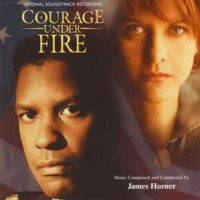- Composed by James Horner
- Angel Records / 1996 / 54m
Edward Zwick’s 1996 movie Courage Under Fire is a very solemn affair examining the effects of war, told through Denzel Washington playing an army colonel who, after being involved (and partially responsible for) a friendly fire incident in Iraq is reassigned to a desk job, where he is tasked with investigating whether the Medal of Honor should be awarded posthumously to a helicopter captain. The film tells her story from the point of view of several witnesses, each one giving a different account, and looks at the effect of the war on each of them.
This was the third and final entry in the very productive collaboration between Zwick and James Horner, and while it isn’t up there with the previous two (Glory and Legends of the Fall, both of which are among the composer’s very finest efforts), it is certainly music worthy of attention, blending very beautiful, elegiac Americana with smatterings of action music into a well-rounded and satisfying package.
The highlight of the album is certainly the opening cue, entitled simply “Hymn”, a beautiful piece of Coplandesque writing that is rather similar (not just in name) to what John Williams would write a couple of years later (and gain considerably more attention in the process) for Saving Private Ryan. I think the track in this form was written especially for the album and it’s a notable piece of music, the melody from which serves as the score’s main theme.
The score proper gets underway in the ten-minute “Al Bathra”, which is very different. It opens with an ingenious sound effect, a helicopter’s rotor gradually getting going and blending into the orchestra, and after a solemn opening it launches into action, horns and snares, electric guitar and keyboards, very dynamic though by design a little detached. On the other hand there’s nothing detached about “Friendly Fire / Ilario’s Story”, which tugs at the heartstrings very acutely with its gorgeous string writing, the music laden with tragedy. Needless to say “The Elegy” pushes that even further (with a title like that, it could hardly not) – it’s a sublime piece that to an extent recalls the most impassioned parts of Glory, so emotional and so effective.
The six-minute “Courage Under Fire” is back to the Copland sound (and if you put it in the middle of the Saving Private Ryan album you probably wouldn’t know it didn’t belong there). It’s simple, straightforward, direct writing with no frills and it hits the mark perfectly. “Monfriez’s Suicide” is more suspenseful at first, but then returns to the action style of the earlier “Al Bathra” (albeit orchestra only this time). “Night Mutiny” is the darkest of the action cues, rhythmic figures rumbling along under low strings; and the dour mood continues in “The Betrayal”, but then there’s a piece of quintessential Horner, “Playing Back the Tape”, desperate drama unfolding with increasing tension before the composer resolves it in sweeping style. The album then comes to a close with one of Horner’s lengthy (in this case very lengthy, at 15 minutes) finale cues, “The Medal of Honor / A Final Resting Place”, which recaps much of the score’s lush Americana including the beautiful hymn.
The very sombre tone of the film resulted in Horner having to deliver something in similar fashion, which means this album features a lot of very serious, frequently sad music – but it is also frequently very moving and beautiful. I don’t really know why “Hymn” and “The Elegy” in particular don’t appear much more often when people talk about Horner at his best because they’re such fine pieces of music, and the bulk of the score is cut from the same cloth. Courage Under Fire possibly suffers because it’s not quite as good as some of the extraordinary music the composer was writing around the same time, but even so it’s an essential part of any Horner collection.
Rating: ****
facebook.com/moviewave | twitter.com/MovieWaveDotNet | amazon.com













I wonder why Zwick and Horner never worked together after this? Perhaps a stealth falling out as happened with Ron Howard? Seems that the director has settled on James Newton Howard as his go-to guy these days.
“Denzel Washington playing an army colonel who, after being involved (and partially responsible for) a friendly fire incident in Iraq…”
Why the deceptive description? Washington’s character wasn’t “involved” in, or “partially responsible for” the friendly fire deaths, he was completely responsible for them. He gave the order to fire on and kill his own men. He thought they were the enemy, but the responsibility was still completely his, which he fully recognizes, which destroys him. His ensuing alcoholism and his C.O.’s attempts to help him, are one side of the story of the rest of the picture, his uncovering of the true incident in which Meg Ryan died, the other side.